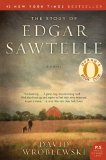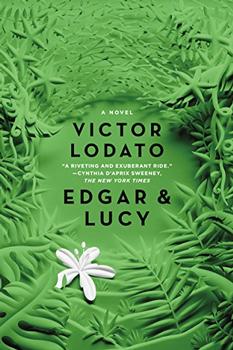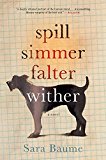Summary | Excerpt | Reading Guide | Reviews | Beyond the book | Read-Alikes | Genres & Themes | Author Bio

A Novel
by David WroblewskiThe Story of Edgar Sawtelle is a long, eventful, and
whisper-quiet book. The story envelopes you so completely and so gently that you
can almost hear the brush of Edgar's sleeves as he signs to his parents.
David Wroblewski hit on a brilliant narrative device when he decided to rob his
main character of his voice. Edgar can hear and understand but not speak—just
like his dogs. Bringing Edgar down to the level of his dogs shows just how
elevated they are as a species. The book gathers speed by building scene upon
scene of subtly amazing communication between boy and dog. In one instance,
Edgar and Almondine conspire to be secretive. Edgar painstakingly discerns where
to step on each floorboard of the creaky staircase in the old farmhouse so that
he can descend without making a sound, and he teaches her the path, picking up
and placing her paws on each quiet spot. In another instance, Edgar and
Almondine conspire to shout. Edgar, desperate to prevent his uncle Claude from
shooting a stray dog in the woods, signs for Almondine to come to him, then stay
and speak. She begins to bay, the stray dog bolts at the sound, and Claude loses
his aim.
These moments are possible because the dogs that Edgar and his parents breed are
extraordinarily responsive and keen, the product of generations of cultivation.
But not one of the Sawtelle dogs is purebred; the Sawtelles breed for
intelligence only. Edgar's father keeps meticulous breeding records in order to
discern "the story of the dog—what a dog meant." Sawtelle
dogs are distinguishable by a certain knowingness in their eyes, a certain
heightened ability to perceive and understand their humans. Edgar's parents have
a near-religious faith in the possibilities of animal training. "From the moment
they opened their eyes the dogs were taught to watch and listen and trust. To
think and choose. This was the lesson behind every minute of training. They were
taught something beyond simple obedience: that through the training all things
could be spoken." In other words, the Sawtelles teach their dogs a
language. With each new litter, Edgar combs through the dictionary to name the
pups, coming up with lovely nouns like Finch, Umbra, and Tinder. But their
communication does not, ultimately travel through words. They connect by
gesture, by look, by pure animal intuition. Training serves to "draw up the ties
between them…as though shaping the world from scratch." Ultimately, Edgar
seeks to transcend the need to command his dogs, wanting only to ask them for
their graceful actions and have them fully consent rather then obey.
As a shaggy dog tale, it doesn't get much better. The dogs practically luminesce
in the gorgeous, precise prose with which Wroblewski conjures them. He is
equally good at describing the dogs' physical characteristics ("He was moving in
a strangely light-footed way for such a solidly constructed dog, lifting and
dropping his paws as if suspended by invisible strings and merely paddling along
for steering.") and their inner lives ("For she was not without her own
selfish desires: to hold things motionless, to measure herself against them and
find herself present, to know that she was alive precisely because he needn't
acknowledge her in casual passing; that utter constancy might prevail if she
attended the world so carefully.").
But as the book jacket hints, The Story of Edgar Sawtelle is really two
stories superimposed upon one another. The slow-moving chronicle of Edgar's
boyhood among the dogs and his education in dog training gives way to a
fast-paced, deeply melodramatic, magical realist, murder mystery when his father
dies unexpectedly and his uncle woos his mother. This is a strange pairing
indeed: Lassie meets Hamlet, complete with the dead father's
return as a ghost. I'm not sure what made Wrobewksi think that he could retell
one of the English language's most canonical pieces of literature as a dog
story, but it works. It works because Wroblewski believes so unfailingly in his
own story and plunges into it with the unquestioning eagerness of one of his own
canine characters.
But as a shaggy dog tale, it could have used a quick grooming. Edgar almost
never feels like a child, just as the setting never really feels like the 1950s.
Wroblewski trades specificity for suggestiveness so often that his story blurs
at the edges, like the soft-focus painting on the book cover. There are several
plot points—Edgar's fascination with the unexplained Starchild Colony in Canada,
a voluble ghost in a taciturn man's shed—that never go anywhere. But these burrs
are easily overlooked, because there is nothing as pleasurable as starting out
the summer with a big, fat book, and The Story of Edgar Sawtelle
justifies its own length and heft.
Dog lovers will take to this book like, well, like a retriever to water (beware,
though, that you may come away feeling badly about treating your own dog like a
pet rather than a glowingly, steadfastly sentient being). Yet the book also
transcends its subject matter, and anyone who loves a good yarn, one that
confidently soars well past the borders of believability, will take to it as
well—and might even find themselves with the urge to head down to their local
animal shelter.
![]() This review was originally published in The BookBrowse Review in June 2008, and has been updated for the
November 2009 edition.
Click here to go to this issue.
This review was originally published in The BookBrowse Review in June 2008, and has been updated for the
November 2009 edition.
Click here to go to this issue.

If you liked The Story of Edgar Sawtelle, try these:

by Victor Lodato
Published 2018
A new literary novel from Weissberg Award winning playwright and PEN USA Award for Fiction winning writer Victor Lodato, Edgar and Lucy is a masterfully written story of a broken family struggling to stay together.

by Sara Baume
Published 2017
A debut novel already praised as "unbearably poignant and beautifully told" (Eimear McBride) this captivating story follows - over the course of four seasons - a misfit man who adopts a misfit dog.
Your guide toexceptional books
BookBrowse seeks out and recommends the best in contemporary fiction and nonfiction—books that not only engage and entertain but also deepen our understanding of ourselves and the world around us.